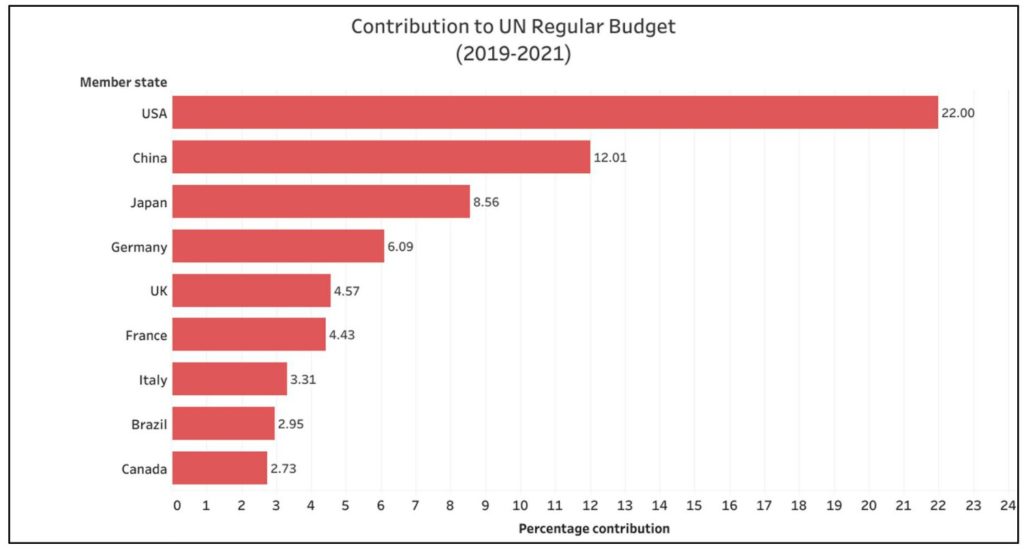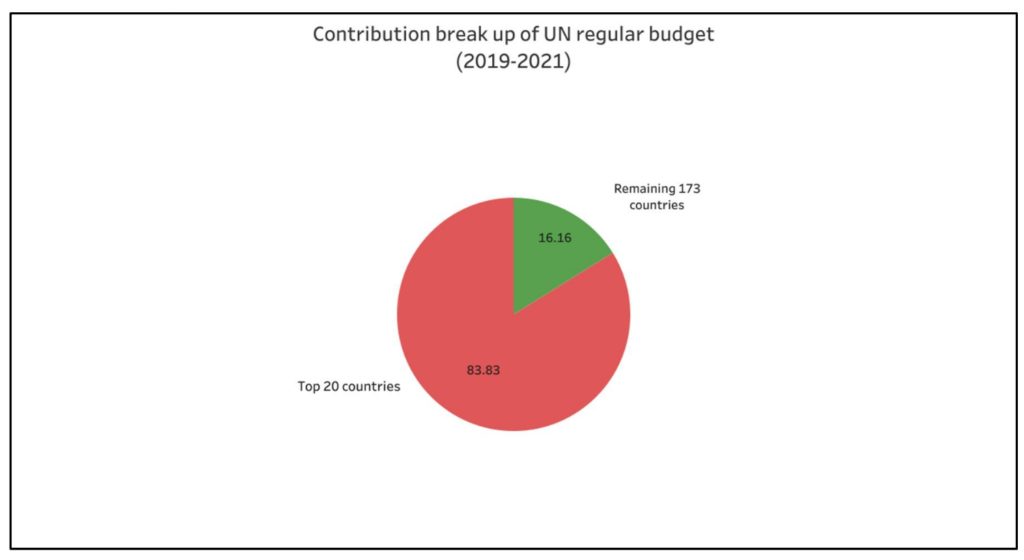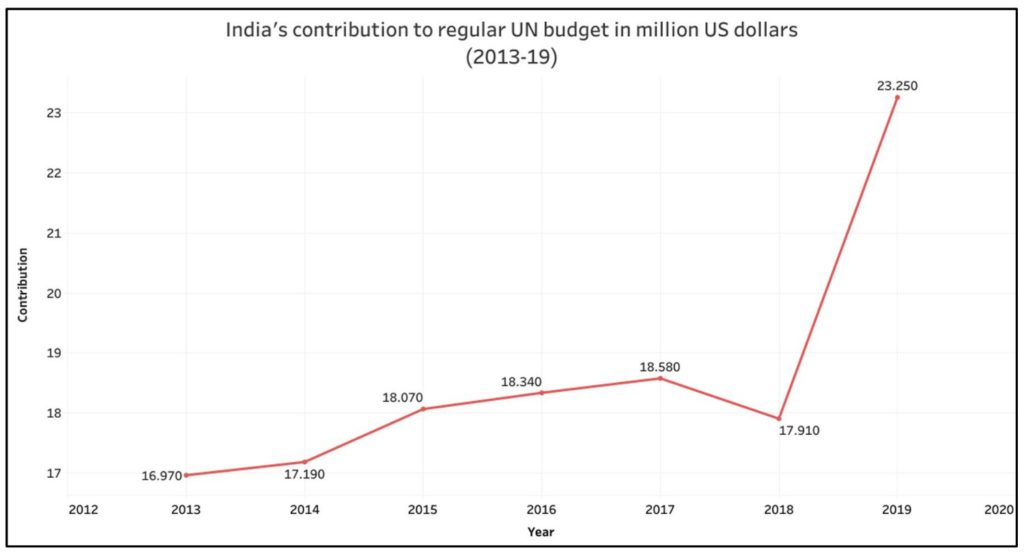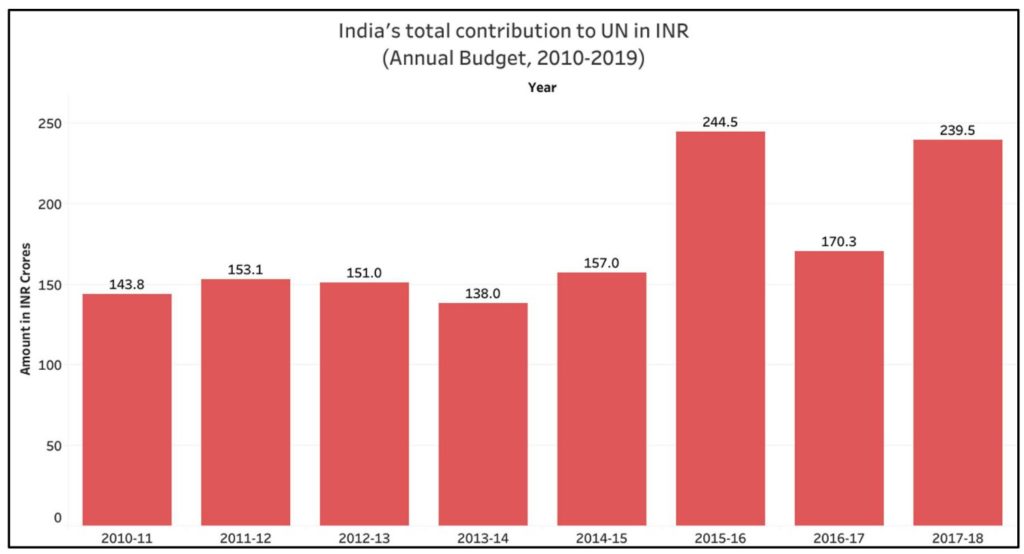[orc]The United Nations operations are sustained from the contributions received from member countries. Contributions from member countries are assessed every 3 years and are fixed based on a variety of factors. Here is a detailed explainer with the numbers.
The United Nations (UN) is an international organization founded in 1945. It is currently made up of 193 Member States. The mission and work of the United Nations are guided by the purposes and principles contained in its founding Charter.
Article 17 of the U.N. Charter specifies that the U.N. General Assembly will determine the basis for payment of the expenses of the organization. The expenses shall be borne by the members as decided by the General Assembly.
What is the basis for deciding the quantum of contribution of each member?
Each member state of the UN is obligated to contribute to the UN. The contribution is calculated on the basis of scale of assessments. The Committee on Contributions is entrusted with the job of deciding the quantum of contribution.
To determine the scale of assessments, the Committee on Contributions uses estimates of each member state’s gross national product (GNP) and a number of adjustments, including for external debt and for low per capita incomes. The assessment thus takes into account the country’s share of the global Gross National product with discounts given for low per-capita income and the country’s external debt. This is with respect to the regular budget of the UN. Similar assessments are done for other organizations of the UN including the peacekeeping operations. For deciding contribution to the peace keeping operations, adjustments are made for average per capita GNP compared to global average GNP.
The General Assembly has directed that the percentage shares range from a minimum of 0.001% to a maximum of 22%, and a maximum of 0.01% for those nations designated as “least developed countries.”
The scale of assessments is normally reviewed after every three years. The current time period of assessments is for the years 2019-2021.
Who contributes the most to the regular UN budget?
As expected, United States of America contributes the highest with a share of 22%. USA’s GNP in 2018 is approximately 24% of the total GNP of all the member countries of the UN and thus its highest share of contribution is justified.
China contributes the second highest with 12.005%, followed by Japan (8.564%), Germany (6.09%), United Kingdom of Great Britain and North Ireland (4.567%) and France (4.427%) in the top five after USA. Italy has surpassed Brazil (2.948%) in the list to become the seventh largest contributor (3.307%).
18 Countries contribute more than 1% each to the UN regular budget. 175 countries contribute less than 0.1% each including India’s neighbours Pakistan, Bangladesh and Nepal. Of these 175 countries, 29 countries contribute only 0.001% each.

Out of the 193 countries part of the UN, the top 20 countries contribute 83.83% while the other 173 countries contribute 16.16% only. The top 10 contributors account for 69.047% of the total contributions. The total regular UN budget for the year 2018-19 is $5.56 billion. A total of 112 member states have paid their regular budget assessments for 2019 in full as of August 20, 2019. India paid $23.253 million in January within the 30 day due period.

How much does India Contribute?
According to the assessment made for the years 2019-21, India has to contribute 0.834% to the UN regular budget, up from 0.737% during the 2016-18 period. India’s share in global GNP is now around 2.772%. This has resulted in India becoming the 21stlargest contributor as compared to 24th position in the previous assessment cycle. There is an 8.8% increase in India’s contribution. Based on the assessment by the contributions committee, India’s contribution to the UN regular budget was fixed at 0.534% for 2009-12 and 0.666% for 2013-2015.
India’s contribution to the UN regular budget was $16.97 million in 2012-13, $17.19 million in 2013-14, $18.07 million in 2014-15 and $18.58 million in 2017. India’s actual share is $25.5 million dollars in 2019, but is given a credit of $2.3 million for the income tax exemption extended by India for the UN staff working in India. Hence the net share of India’s contribution is $23.25 million. There is a sharp increase in 2019 because of the increase in the share of India’s contribution for 2019-21 cycle.

India also contributed to the other UN agencies like the UNDP, UNICEF, UNEP etc. India’s contribution to UN peacekeeping operations was fixed at 0.1068% for the period 2009-12 and at 0.1332% for the period 2013-15 and 0.1474% for the period 2016-18. For the period 2019-21, it has been fixed at 0.1668%. The total peacekeeping budget of the UN for 2019-20 is $6.51 billion.
Among the BRICS nations, India’s contribution is more than only South Africa. Brazil, Russia and China contribute more than India to the UN budget.
India’s total contribution to the UN (including for all UN agencies) was Rs. 138 crore in 2013-14, Rs. 157 crore in 2014-15, Rs 244 crore in 2015-16, Rs. 170.28 crore in 2016-17 and Rs. 239.47 crores in 2017-18. This has been illustrated in the following graph. It is clearly visible that India’s highest contribution was in the financial year 2015-16 followed by 2017-18.

UN faces shortage of funds
Despite the contributions made by the member states for regular and peacekeeping budget, the UN faces shortage in funds. In 2018, in order to meet the expenses, the organisation had to make use of the funds from closed peacekeeping operations.
Peacekeeping budgets are allocated to new missions undertaken by UN and for expansion of existing missions. The funds of one mission cannot be used for another even if it faces a deficit. For the peacekeeping missions, there are countries that supply the required troops and police personnel for which the UN pays. As of March 2019, the pending payment is $265 million and might increase to $588 million by June 2019. These numbers were mentioned in the report of the Secretary General on ‘Improving the financial situation of UN’. The pending payment to India is $38 million from the UN for peacekeeping operations as of March 2019.



3 Comments
I really thought India’s contribution to UN Budget will be much more than that
Pingback: How much does India contribute to various International Agencies? - Fact Checking Tools | Factbase.us
Pingback: Explainer: The What & How of the United Nations General Assembly (UNGA) - Fact Checking Tools | Factbase.us